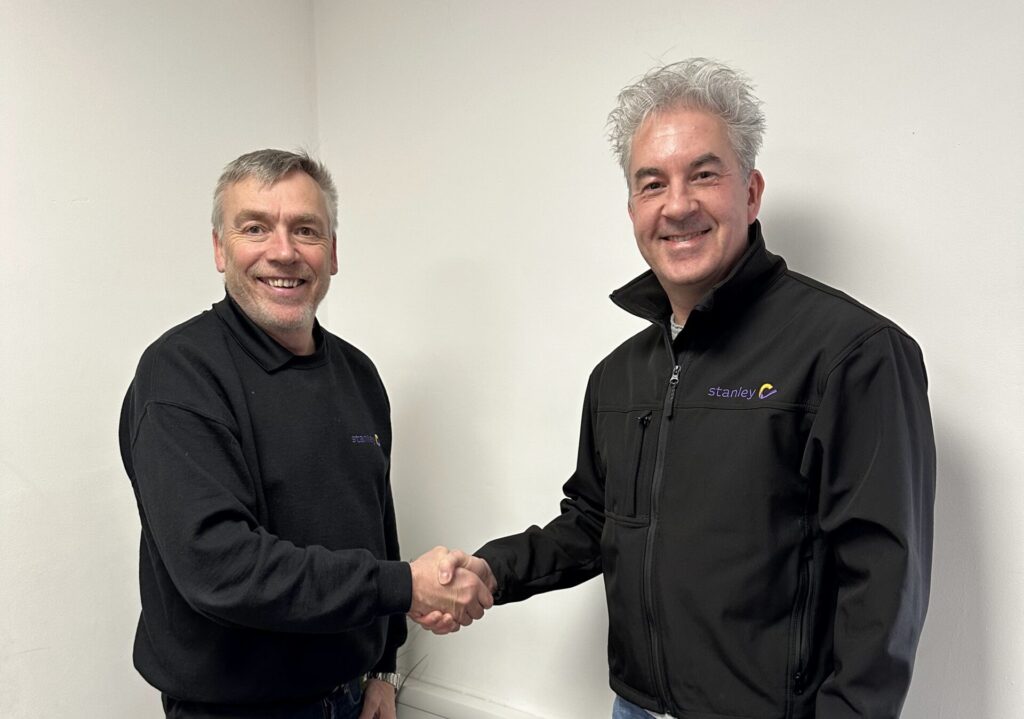H&S experts Stanley, sees growth in AI wearable safety technology market as it creates new dedicated team

Health and Safety experts, Stanley, based in St Albans, has created a new Ergonomic Safety Tech division and appointed Andre Jutel to lead it, as it bolsters its AI wearable technology offering. The organisation is focusing extra resources and expertise into this technology as the UK market takes off.
Andre Jutel has worked in the technology sector for over 20 years for some of the world’s largest companies including Samsung and Philips. He has a background in data and data I.O for C-suite clients working at boardroom level. He also has experience of working in the exoskeleton market with a focus on health and safety in business. He is joined on the team by Katie Coan as a new dedicated sales manager for ergonomic technology.
Andre Jutel says:
I am delighted to be joining Stanley at this exciting time, heading up its new Ergonomic Safety Tech division and the commercial delivery of our suite of solutions and products into the market. This wearable technology is bringing disruptive change to the Health and Safety sector and new opportunities to improve business efficiency by cutting workplace accidents, and I look forward to being part of Stanley’s growth in this sector.”
Graham Sharp, Managing Director of Stanley says:
“As a company with over 75 years of experience in offering Health and Safety solutions to business, we are already seeing the benefits that AI wearable technology can offer in terms of improved productivity and reduction in workplace accidents. I am delighted that Andre is heading up our new Ergonomic Safety Tech Division and looking forward to seeing continuing fast growth as these technologies start to enter the mainstream.”
According to the latest figures from the Health and Safety Executive, the total number of cases of work-related musculoskeletal injuries in 2021/22 in the UK was 477,000,and a more recent 2023 survey conducted by the CIPD and Simplyhealth found that 51% of long term sickness absences in the UK are caused by musculoskeletal injuries. Wearable technologies have the ability to help businesses reduce these numbers dramatically by collecting and tracking detailed employee data to focus on where the biggest risks to workplace safety lie.
The technologies exclusively being offered by Stanley in the UK are:
- WearHealth from Stanley uses video scanning technology to match workers with exoskeleton suits designed to help improve their safety, health and wellbeing. The objective is to assist workers when lifting heavier loads, working longer hours, or executing ergonomically unsafe tasks, and to make sure that their usual daily activities can be performed without getting overly fatigued or at risk of musculoskeletal disorders. Stanley offers health and safety advice and the option to test exoskeletons in-situ to assess comfort and level of support based on real time data generated by the wearer. If they are effective, then the right exoskeletons can be implemented and used as required.
- The Modjoul Smartbelt from Stanley is an innovative AI driven belt that prevents injury through real-time feedback and data analysis. The belt is designed to measure a range of workplace risks including lower back movement and general ergonomic risk. This SmartBelt technology can also be used as a collision avoidance system using AI technology to report potential collisions between workers and machinery in real time, delivering another layer of dynamic workplace safety.
- Inteliforz™ from Ansell: The Inteliforz™ pod identifies risky hand and wrist movements with a small wearable device that is inserted into a hand wrap which can then be worn over a protective glove. It can capture up to 60 hand and wrist motions every minute to assess risk, allowing workers to view their movements and undertake training and coaching opportunities if needed. If a worker makes a movement that might put them at risk of injury, the device delivers a haptic buzz to remind them to adjust position. The charging station also establishes data communication with cloud services to upload the Wearable Pod Sensor data daily to the Cloud.
These products working in conjunction with each other providing insights and new ways to improve workplace productivity and efficiency whilst maintaining employee safety.





